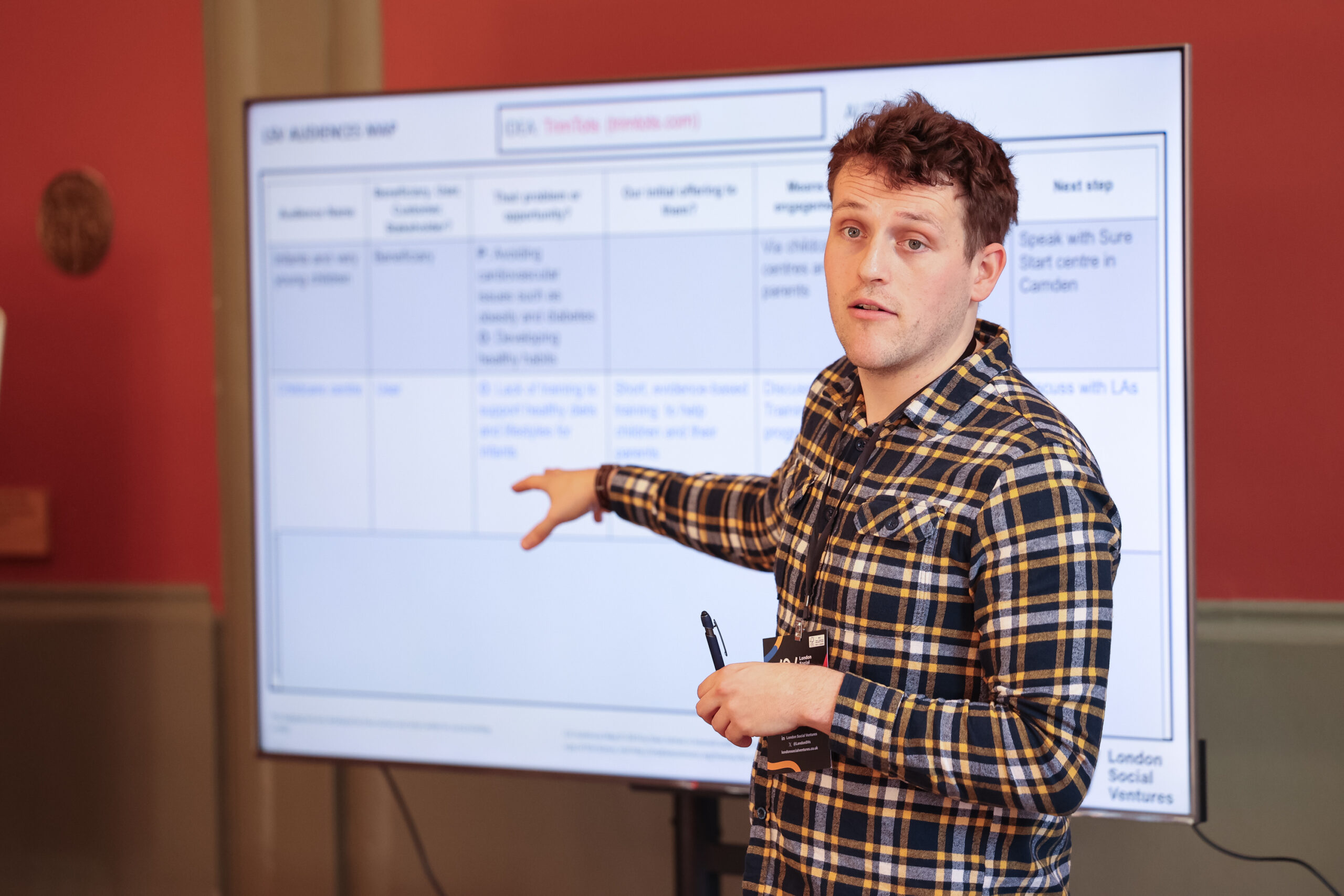Sparking Ideas and Building Social Ventures: Lessons from our Early-stage Programmes
by Will Russell, Social Venture Development Manager at LSV
London Social Ventures uncovers promising ideas from London’s universities and gives them the chance to make a real impact. We support researchers, students, and graduates to turn their insights into social ventures — shaping concepts, finding audiences, and building revenue models so ideas can launch and grow. Our early-stage programmes support participants at the start of their social venture journey, helping them begin to think like social entrepreneurs. Now that we’ve been delivering these programmes for a year, this blog shares what we’ve learned — and what’s coming next in the new academic year.

Not every idea from London’s research base should become a social venture. It’s just one of many possible routes to impact. But it’s a powerful and underused one. When the right founder meets the right idea, social ventures can become a brilliant way to transfer university knowledge, create lasting social change, and open up new opportunities for the researcher, student, or graduate innovators.
Our early-stage programmes – Spark and Build – equip participants with the skills, support, and connections to begin translating research insights into ventures with real-world impact. Together, they form the first steps in a pathway that continues through our new Validate programme (announced below) and on to Catalyst, our programme for later-stage ventures that we’ll explore in a future blog.
The problem we’re tackling
London’s universities are bursting with ideas that could make a difference. The problem? Too many never get beyond the research stage. Promising solutions to social problems are developed and tested, then stall once funding runs out.
Take a typical social science research project: over four years, a team might build a strong evidence base, forge valuable partnerships, and design an intervention ready for wider adoption. But when the grant finishes, the project often grinds to a halt. The idea is shelved, and the researcher moves on.
The same pattern holds for students and graduates. Many have the knowledge, passion, and ideas to tackle pressing issues, but lack a clear pathway to make their vision real.
This is where social ventures come in. By borrowing entrepreneurial tools, they can help solutions find the right audience, demonstrate value, and generate revenue. The result: ideas that no longer depend on short-term research funding, and innovators who can see a tangible route to scaling their impact and their careers.

What our early-stage work is trying to achieve?
Awareness and inspiration: We want social venture to be a more widely recognised route to impact, and individuals at London universities with ideas that could make a difference to be inspired and given confidence by our structured social venture support pathways.
Concept development: We want to give potential founders the time and support to develop an initial social venture proposition, have early stakeholder conversations and begin to explore business and funding models.
Early testing and customer feedback: We support founders in designing and running early customer-facing pilots. This real-world testing is crucial to ensure solutions are practical and are developed in ways that meet customer needs.
What have we achieved so far?
Last academic year we worked with over 150 participants from 14 of London’s universities via our Spark workshops and Build programmes.
We delivered Spark workshops online and on campuses across London. These sessions have helped researchers, students and graduates understand what a social venture is and what makes one viable. Participants explored real life examples created by their peers and reflect on their own research, ideas or experiences as a starting point for a social venture project.
We’ve then gone on to support 37 early-stage ventures over three cohorts of our Build programme, turning ideas into credible social venture projects. These venture emerged from the programme with a refined social venture proposition, early stakeholder conversations underway and an early pilot designed and ready to be delivered. We then distributed 24 small grants to make these pilots a reality.
We’ve also be supporting 16 more advanced ventures in our Catalyst programme, but we’re going to cover that work in a future blog.

What have we learnt?
Connections matter: It’s been striking how much benefit our early-stage participants gain from working with their peers on our programmes, whether that be fellow researchers or students. Participants get useful practice explaining their solution to people outside their own area of expertise, while also gaining new perspectives on potential audiences or opportunities.
Push founders to engage customers early: Social entrepreneurs often prioritise beneficiaries, which helps refine solutions but overlooks paying customers. To build viable ventures, pilots must also test customer assumptions, something founders may find daunting and need encouragement to do.
Market validation is essential, but tough: After Build and an initial pilot, ventures aren’t yet market ready. They still need to continue to validate assumptions, refine their offer, and engage stakeholders before early sales are possible. This stage is challenging, and many founders lose momentum, which is why we’re launching our new programme, LSV Validate.
What’s next?
We’ve got a busy schedule of early stage workshops and programmes across autumn and winter, including a new programme, LSV Validate.
LSV Validate: Launching January 2026
New for January, we’re piloting LSV Validate — an 8-week sprint that bridges Build and Catalyst. It combines 1:1 venture manager support with practical training to help ventures crack market validation: mapping the competitive landscape, engaging stakeholders, testing assumptions, and building a strategy that balances sustainability with impact.
To express and interest in the programme, fill out this form here.
To recommend a venture at your institution for this programme contact us here.


LSV Build
We have two Build cohorts scheduled over the autumn and winter:
November LSV Build for academics & researchers: Application deadline: Wednesday, 12th November 2025, click here to sign up.
January LSV Build for students & alumni: Application deadline: Friday, 2nd January 2026, click here to sign up.
LSV Spark
We also online Spark workshops taking place across October and November. Signups are open via our website here.
Stay up to date with the latest news and events
If you would like to be kept up to date with the latest news at London Social Ventures as well as join our mailing list please do get in touch as we would love to hear from you.

